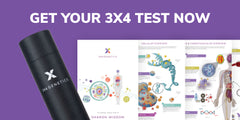The State Of Functional Medicine 2020: Insights From Rachel Headings
3X4’s new State of Functional Medicine series features interviews with a diverse range of active practitioners and established thought leaders to learn more about why they chose the field of functional medicine, what excites them most about their work, the most common misconceptions they hear from patients, and most importantly — how they see the field evolving in the years ahead as healthcare shifts to be more personalized, proactive, and preventative.
Functional medicine practitioners play a key role in helping patients understand who they are so they can improve their quality of life which is what we’re all about here at 3X4. Our goal with this new series is to celebrate the work these practitioners are doing and inspire others to explore the exciting field of functional medicine.
The following is an interview we have recently had with Rachel Headings, Certified Functional Medicine Provider with IFM, aLIVE Functional Medicine
Why did you decide to make functional medicine your focus?
RH: Functional medicine has been my passion since 2011 when I was introduced to it by one of my friends/colleagues. I was chronically ill as a child and didn’t understand why I was so sick all the time until I went to my first functional medicine training. It was at that conference that they were able to explain to me why I was so sick all those years. They connected all the dots and showed me a way to get better. I was able to apply what I learned from that conference to my own health and no longer struggle with asthma, rashes, fatigue, or GI distress. I want others to be able to restore their health through functional medicine. When evaluating the client with a systematic approach + functional medicine labs, it is magical what you can offer patients. Treating root cause, at the cellular level with personalized protocols tailored to the client’s unique lab results can help the body regain balance and the symptoms resolve.
Who have been your greatest mentors in your functional medicine journey?
RH: Karyn Shanks, MD: she was the one who introduced me to functional medicine and was my mentor starting my first functional medicine practice. She understands how the body, mind, and soul connect to bring healing. I also love Jeffry Bland, MD (founder of the Institute for Functional Medicine-IFM) and Bob Roundtree, MD (educator for IFM). They have taught me so much and I would not be where I am today without them.
What excites you most about your day to day work?
RH: I am most excited each day to be present with my clients and help guide them on their healing journey. Each client is so unique, it brings me great joy to show up and give them all the attention they need to feel supported, heard, and validated on their healing journey. I also love interpreting functional labs and designing personalized protocols. It takes the guesswork out of the treatment plan.
What’s the most challenging part of your day to day work?
RH: The most challenging part of my day is fitting in all the things I want to get done in a day. I am a busy mom of 3 and I also coach basketball for my daughter’s team. I am very intentional with my time and schedule to make sure the priorities of the day get completed. I find with good time management the day flows nicely.
What do patients most commonly get wrong about functional medicine?
RH: Many think functional medicine is voodoo. They have not heard of it and think it is not science based. Functional medicine was created by MD’s and is based on science. It does not see the body as a bunch of specialities but as a whole using a systematic approach to health/healing. It is not alternative or complimentary- but comprehensively treats the ROOT cause of disease.
What’s holding the field of functional medicine back?
RH: What is holding functional medicine back is that insurance companies do not recognize the value in functional medicine so they do not cover our services. If they were on board and realized how much money we would actually save preventing and reversing chronic disease they would cover our time and services making functional medicine more accessible to the public. Without insurance support functional medicine is an added cost for those who are searching for a way to get better and have found no answers in the conventional medicine model.
What has your experience been with genetic testing?
RH: I love genetic testing and use a company called The DNA Company to look at my client’s genetics. I use this information to develop long term lifestyle guidelines that can help my clients experience long term symptoms relief. Genetics load the gun but lifestyle pulls the trigger so there is a lot of power in knowing your genetic code so you can use your lifestyle to override your susceptibilities. Just because you have the genetics for something doesn’t mean you will have those symptoms, the power is in lifestyle choices.
How do you see the practice of functional medicine evolving in the years ahead?
RH: I see my virtual functional medicine evolving and growing over the next years ahead. I plan to continue creating ways to expand my business and reach more people. Everyone deserves to have access to functional medicine if they choose. Conventional medicine is limited in what it can offer for chronic issues, as more and more people realize that they will be looking for functional medicine providers to connect the dots and help them get better.
About Rachel Headings
Rachel is a virtual functional medicine practitioner at aLive Functional Medicine who helps motivated people enhance energy, stabilize mood, and restore GI function so they can get back to living life with renewed confidence and joy!
Shop 3X4 Genetics Test

